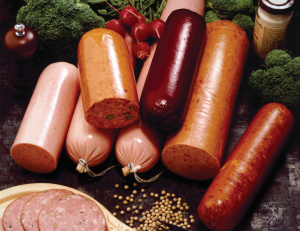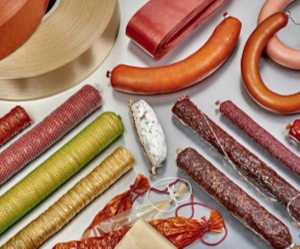
In the mid 1930’s, fibrous casings were introduced as another casing alternative for the meat industry stuffing needs as consumer demand increased.
Fibrous casings are manufactured using the viscose process: wood cellulose is solubilized, treated, and viscose is formed. The viscose is then impregnated into a special filament paper as it is being formed into a tube. This coated tube moves into a bath, which regenerates the original cellulose.
Fibrous casings are the toughest casings produced and they are used where maximum uniformity of the finished product diameter, be it sausage or smoked meat, is desired. The uniformity of products stuffed in these casings make them ideal for slicing for prepackaging.

The combination of optimal selection of the raw materials, experienced production and techniques and quality control provides the following features for Quality Casing Co., Inc. fibrous casings:
- Superb strength
- Reliable size consistency
- Moderate permeability to moisture and smoke which is one of the significant characteristics of fibrous casings
- Good machine-ability at high speed stuffing
- Able to be converted to customized form
- Easy to dispose
We stock a variety of pre-cut sizes in both clear and mahogany, printed and plain. We specialize in custom cutting and pride ourselves on minimal lead-time and competitive pricing.
- The following three types of fibrous casings are available:
- Regular—The common applications for regular type fibrous casings are bologna, mortadella, cooked salami and dry sausages for slicing and similar products, which do not require special peeling or adhesion feature on casings for the encased products throughout the process.
- Easy Release – The most common uses are for cooked and smoked ham and produces to be sliced. This type can also be used for processed and smoked cheese. The easy peelable type of fibrous casing has an inner surface that is specially treated during its production to make itself easy peelable from the encased product without disrupting the products surface.
- Protein Coated—The most common applications for this type of fibrous casing are for dry and semi-dry sausages, such as salami, pepperoni and summer sausage. The good adhesion type has an inner surface that is specially treated during its production so that it may adhere to and shrink with the encased product as it dries.
Regardless of the application you are producing, a fibrous casing will only increase your productivity and enhance your product line.
We have professionals ready to assist you with any questions you might have concerning how fibrous casings can put your product out front.
